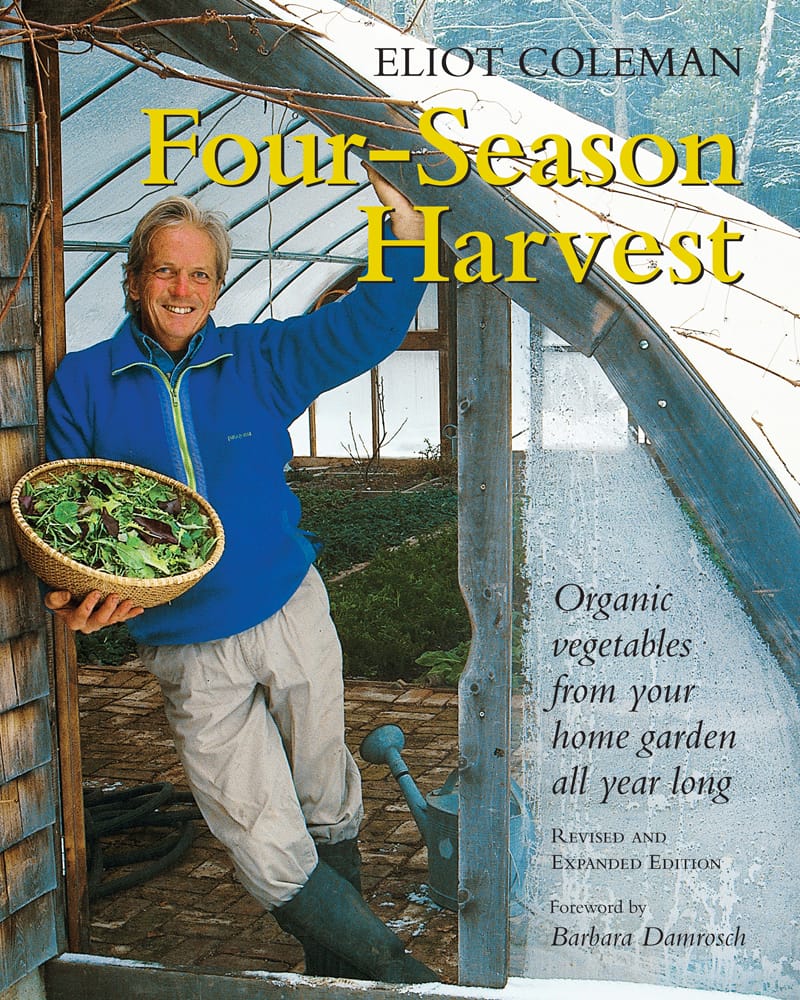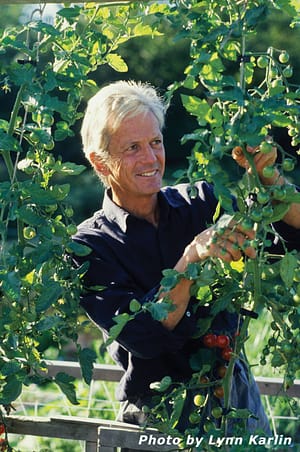Four-Season Harvest
Organic Vegetables from Your Home Garden All Year Long, 2nd Edition

| Pages: | 236 pages |
| Book Art: | Black and white line drawings, 8-page color insert |
| Size: | 8 x 10 inch |
| Publisher: | Chelsea Green Publishing |
| Pub. Date: | October 1, 1999 |
| ISBN: | 9781890132279 |
Four-Season Harvest
Organic Vegetables from Your Home Garden All Year Long, 2nd Edition
Illustrated by Kathy Bray
“Eliot is the reason I’m cooking. . . . I’ve followed that path because Eliot made it possible, and exciting, to farm in the four seasons.”—Dan Barber, chef
“There is hardly a more well-known or well-respected name among organic farmers than Eliot Coleman.”—Civil Eats
Learn season-extending techniques and eat the best food—garden fresh and chemical free—all year long, with little effort or expense.
If you love the joys of eating home-garden vegetables but always thought those joys had to stop at the end of summer, this book is for you. Eliot Coleman introduces the surprising fact that most of the United States has more winter sunshine than the south of France. He shows how North American gardeners can successfully use that sun to raise a wide variety of traditional winter vegetables in backyard cold frames and plastic covered tunnel greenhouses without supplementary heat.
Inside, you’ll also learn:
- Composting techniques
- Simple Mineral Amendments
- Planning and preparing your garden site
- Seeds for four seasons
- How to build cold frames, high tunnels, and mobile greenhouses
- How to cope with snow
- How to create a root cellar and other storage techniques
- And much, much more!
Coleman expands upon his own experiences with new ideas learned on a winter-vegetable pilgrimage across the ocean to the acknowledged kingdom of vegetable cuisine, the southern part of France, which lies on the 44th parallel, the same latitude as his farm in Maine.
This story of sunshine, weather patterns, old limitations and expectations, and new realities is delightfully innovative in the best gardening tradition. Four-Season Harvest will have you feasting on fresh produce from your garden all through the winter.
“The man, the farmer, the legend, is Eliot Coleman.”—The Atlantic
To learn more about the possibility of a four-season farm, please visit Coleman’s website www.fourseasonfarm.com.
Reviews and Praise
Publishers Weekly-
From first sentence to last, Coleman's ( The New Organic Gardener ) book is a delight--an earnest guide written with an impish sense of humor. It will refresh anyone who wants to get the most from a vegetable garden yet doesn't want to devote too much time and energy to the process. Apparently Coleman thoroughly enjoys every phase of gardening--from planting crops to weeding. Who else has ever suggested, only half in jest, dancing with a hoe? Or keeping a pair of ducks for pest patrol? This is that kind of book. It's also a book full of valuable information on how to harvest fresh vegetables and salad ingredients literally year-round--yet without an expensive greenhouse or indoor light garden set-up. Coleman combines succession planting (small sowings three or more times, rather than one big endeavor) with cold-frame growing in the winter months. He includes how-tos for building simple cold-frames. Given the fact that he lives in Maine, his advice seems all the more reliable. He believes in simplicity ("If what I am doing in the garden seems complicated, it is probably wrong"), seasonality (tomatoes in summer, broccoli in fall, mache in February) and diplomacy in the garden (which "has more to teach us than just how to grow food"). Here, his philosophy of organic growing is shared easily. The book concludes with an extensive chapter on the vegetables that comprise his "cast of characters." Illustrated. --This text refers to an out of print or unavailable edition of this title.
More Reviews and Praise
"Four-Season Harvest is a magnificent work. It's enticing, inspiring, sensible, and it opens a whole new world for the home grower."--Peter Fossel, Country Journal








